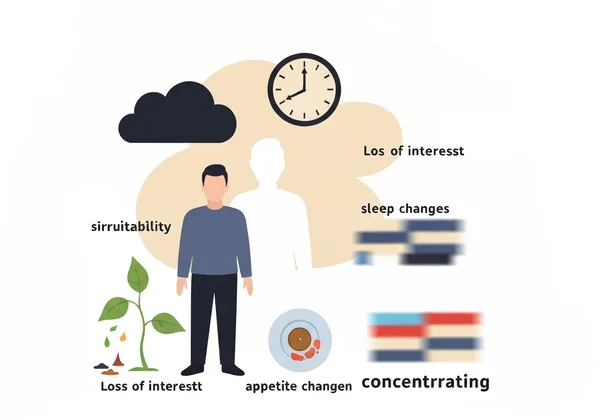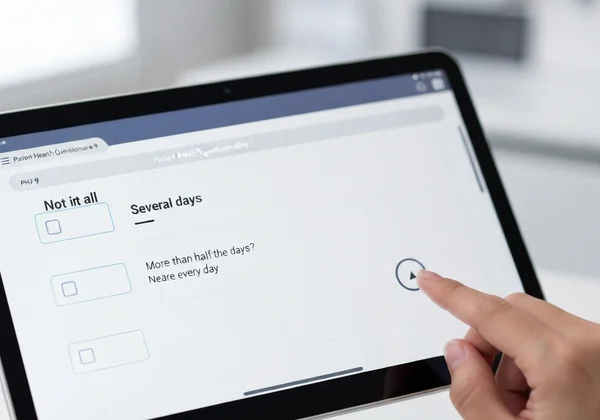PHQ-9: Talk to Loved Ones About Their Mental Health
September 2, 2025 | By Clara Holloway
Watching someone you care about struggle with their mood can be heartbreaking and confusing. You may have noticed they're not quite themselves—perhaps more withdrawn, irritable, or just less interested in things they once loved. It’s natural to want to help, but approaching the topic of mental health can feel daunting. What is the right way to start a conversation about their emotional well-being? The PHQ-9, or Patient Health Questionnaire-9, can serve as a gentle and objective starting point. This guide offers practical, empathetic ways to open a dialogue, using the PHQ-9 as a neutral tool to better understand and support them. For a clear example, you can explore the free PHQ-9 assessment to see how it works.

Starting the Conversation: How to Talk About Mental Health Effectively
The first step is often the hardest, but creating a supportive environment can make all the difference. Your goal isn't to diagnose or fix them, but to show you care and are there to listen. Effective communication is key to making your loved one feel seen and heard rather than judged or pressured.
Recognizing the Signs: When to Be Concerned About a Friend or Family Member
Before you speak up, it helps to be clear about what's concerning you. While everyone has bad days, a consistent pattern of certain behaviors could signal a deeper issue. Pay attention to changes that have lasted for two weeks or more.

Some common signs include:
- Persistent Sadness or Irritability: They may seem down most of the time, or they might be unusually short-tempered or angry.
- Loss of Interest: A noticeable disinterest in hobbies, work, or social activities they used to enjoy is a key indicator.
- Changes in Sleep or Appetite: Are they sleeping much more or less than usual? Have their eating habits changed significantly, leading to weight loss or gain?
- Fatigue and Low Energy: Complaining of feeling tired all the time, even after a full night's sleep, is a common symptom.
- Difficulty Concentrating: Trouble focusing on tasks, making decisions, or remembering things can be part of the picture.
Noticing these signs is the first step. The next is to approach them with genuine care and concern.
Creating a Safe Space: Tips for Empathetic Communication
How you say something is just as important as what you say. Your approach can determine whether the conversation is a helpful bridge or an uncomfortable confrontation. To foster a safe and open dialogue, choose a private, comfortable setting where you won't be interrupted.
Here are some tips for more empathetic communication:
- Use "I" Statements: Frame your concerns from your perspective. Instead of saying, "You seem depressed," try, "I've been worried about you lately because I've noticed you haven't been joining our weekly game nights."
- Listen More Than You Talk: Ask open-ended questions like, "How have you been feeling lately?" and then give them space to answer without interruption. Validate their feelings by saying things like, "That sounds really tough," or "I'm sorry you're going through that."
- Avoid Offering Unsolicited Advice: It’s tempting to jump in with solutions, but this can make the person feel like a problem to be solved. Focus on listening and offering your support first.
- Reassure Them: Let them know they are not alone and that you are there for them, no matter what. This simple reassurance can be incredibly powerful.
Introducing the PHQ-9 as a Support Tool for Depression
Sometimes, talking about feelings directly can be difficult. This is where a tool like the PHQ-9 depression test can be incredibly useful. It depersonalizes the conversation, shifting it from your subjective observations to an objective, standardized questionnaire used by healthcare professionals worldwide.

Why the PHQ-9 is a Neutral Starting Point for Discussion
Suggesting a screening tool is often less intimidating than suggesting therapy directly. The PHQ-9 consists of nine simple questions based on the diagnostic criteria for depression. It's not an accusation; it's a check-in, much like taking your temperature when you feel unwell.
You could say something like, "I came across this online tool called the PHQ-9. It's a quick emotional health checkup that doctors use. I was thinking it might be a simple, private way to get a clearer picture of what's been going on. We could even look at it together if you like." This approach empowers them to take a small, concrete step. You can guide them to a confidential emotional checkup that provides instant results.
Understanding the PHQ-9: A Quick Overview for Caregivers
As a caregiver, understanding the basics will help you explain it. The Patient Health Questionnaire 9 asks about the frequency of nine common depressive symptoms over the past two weeks. Each question is scored from 0 (not at all) to 3 (nearly every day). The total score provides a reliable indication of symptom severity, ranging from minimal to severe.
Knowing the phq 9 score interpretation isn't about you making a diagnosis. It’s about helping your loved one understand that their feelings can be measured and understood in a structured way. This often makes the experience feel less overwhelming and more manageable, opening the door to discussing the results and potential next steps.
Beyond the Score: Providing Ongoing Caregiver Support
A PHQ-9 score is not the end of the conversation—it’s the beginning. Your role as a supporter continues long after the initial screening. Providing consistent, non-judgmental support is one of the most valuable things you can do.

Encouraging Next Steps: Professional Help & Resources
If the PHQ-9 score is high or your loved one continues to struggle, the most important next step is encouraging them to speak with a professional. It's crucial to emphasize that the phq9 online tool is a screener, not a diagnostic tool. A doctor or mental health professional can provide a formal diagnosis and discuss treatment options.
You can offer practical support by:
- Helping them find a therapist or doctor.
- Offering to schedule their first appointment.
- Driving them to their appointment or sitting in the waiting room.
Your presence and practical help can reduce the barriers that often prevent people from seeking the care they need.
Maintaining Your Own Well-being While Helping Others
Supporting someone with mental health challenges can be emotionally draining. It's vital to remember that caregiver self-care is not selfish; it's essential. You cannot pour from an empty cup.
Make sure to:
- Set Boundaries: It’s okay to say no or take time for yourself. You are not responsible for their happiness or recovery.
- Seek Your Own Support: Talk to a trusted friend, family member, or a therapist about your own feelings and challenges.
- Stay Active: Continue engaging in your own hobbies and activities that bring you joy and help you recharge.
By taking care of yourself, you'll be better equipped to provide sustained and healthy support to your loved one.
Your Role: A Path Towards Support and Well-being
Taking the first step to support a loved one's mental health is a profound act of care. It requires courage, patience, and empathy. Remember, you don't need to have all the answers. Your role is to open the door to conversation, listen with an open heart, and offer your unwavering support.
The PHQ-9 is a powerful tool to help you start that conversation and gain clarity, but it is a starting point, not a diagnosis. For a free, confidential, and instant assessment that can provide deeper insights, we encourage you and your loved one to explore the resources available on our website. Taking this small step together can be the beginning of a journey toward healing and well-being.
Frequently Asked Questions About Using PHQ-9 to Help Loved Ones
What is the PHQ-9 and How Can It Help My Loved One?
The PHQ-9 (Patient Health Questionnaire-9) is a 9-question screening tool used globally by medical professionals to assess the severity of depressive symptoms. It can help your loved one by providing a quick, objective, and private way to understand their emotional state, making it easier to talk about their feelings and decide on next steps.
Can the PHQ-9 Diagnose My Loved One with Depression?
No. This is a critical point to remember. The PHQ-9 is a screening tool, not a diagnostic one. A high score suggests that a person may be experiencing significant depressive symptoms and should consult a healthcare professional for a formal diagnosis and treatment plan.
Is the PHQ-9 a Reliable Tool for Screening?
Yes, the PHQ-9 is a clinically validated and widely respected tool. It has been proven reliable for screening for depression and monitoring symptom severity over time in various populations. You can trust the PHQ-9 test as a solid starting point for an emotional health check-in.
What Should I Do If My Loved One Has a High PHQ-9 Score?
If your loved one's score indicates moderate to severe symptoms, it's important to encourage them to speak with a doctor or mental health professional. Offer your support in finding help and scheduling an appointment. If their answers to question #9 indicate any thoughts of self-harm, seek immediate professional help or contact a crisis hotline.
How Can I Find Professional Mental Health Help for My Loved One?
You can start by contacting their primary care physician, who can provide a referral. Other resources include searching online databases like the National Alliance on Mental Illness (NAMI) or Psychology Today. Many employers also offer confidential Employee Assistance Programs (EAPs) with free counseling sessions.